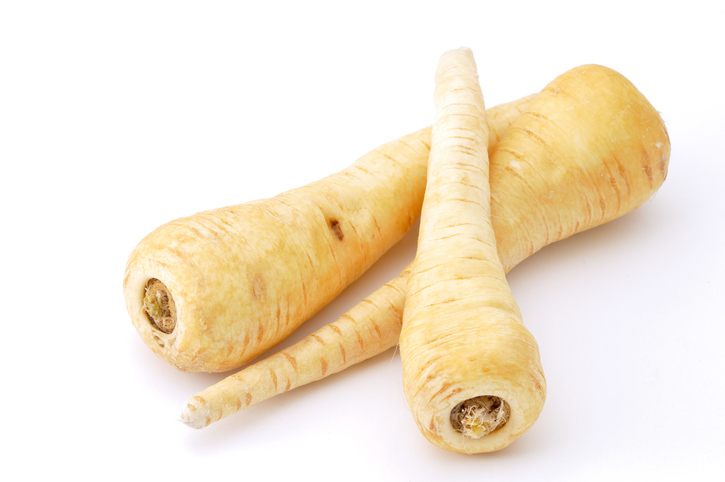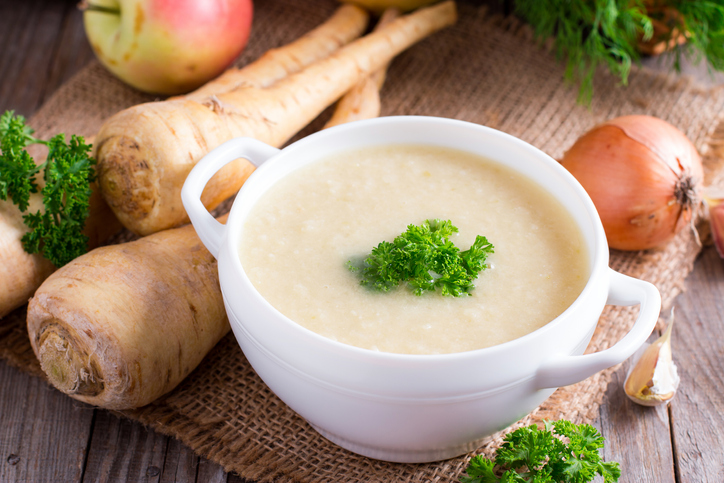Parsnip: The Root Vegetable I Plan On Using A Lot of This Fall

By Joy Stephenson-Laws, J.D., Founder
Fall is the perfect time to eat root vegetables such as carrots, beets and potatoes. They are earthy, hearty and great for making soups. Another root veggie I plan on adding into the rotation is the parsnip.
Parsnips look like large, ivory-colored carrots and are actually related to carrots and parsley (Many people don’t know that parsley can be used for both its leaves and root).
“The flavor of parsnips is really unique, and a little hard to pin down. Fine Cooking describes them as being on the sweet side with a nuttiness, and even ‘a little peppery.’ Medium adds that parsnips have a hint of licorice flavor. All this is not surprising considering anise and fennel are also part of this plant family (via Britannica),” reports Mashed, a website that discusses all things food.
When you cook parsnips, they develop a sweeter taste, and some of the potential health benefits are even sweeter!
“In Persian Medicine parsnip is named as zardak and has many uses such as laxative, libido enhancer, kidney stone crusher and diuretic,” according to a study published by the National Institutes of Health (NIH).
Furthermore, there is evidence that parsnip "can inhibit the growth of cancer cells in the breast, colon, lung and prostate because of the high amounts of coumarins [powerful phytochemicals found in certain types of plants]. In fact, it has anti-inflammatory properties and prevents angiogenesis of cancer tissue and direct invasion of cancer cells into the body.”

Let's take a look at some of the nutrients found in parsnips.
Vitamin C
Vitamin C protects the immune system from deficiencies that may lead to cardiovascular illnesses and other diseases. It is one of the most important nutrients needed for our survival. It is also an antioxidant, which means it protects our bodies from free radicals and other harmful molecules. It is a major producer of collagen, which is the main ingredient behind the repair of bone and skin tissue, cartilage, ligaments, tendons and teeth. Vitamin C also helps moisturize and nourish the skin, which may increase skin elasticity and may even restore a youthful appearance.
Potassium
Potassium is an essential mineral that works with sodium to balance the fluid and electrolytes in the body. Potassium also helps keep blood pressure under control and may help reduce kidney stones and bone loss as you age. It may even reduce your risk of stroke.
Calcium
Of course, calcium is important for building and maintaining strong bones and teeth. This mineral is also important for maintaining hair and nail health in perimenopausal and menopausal women. Adequate calcium intake may also decrease your risk for colorectal cancer.
Magnesium
This mineral is known to help with blood pressure regulation. Magnesium is important when it comes to managing blood pressure levels. Magnesium and calcium work hand in hand to manage blood pressure and cardiovascular health.
Vitamin K
Many people do not know much about vitamin K, but it may help you live longer! This vitamin is so important to our health that it is recommended that newborn babies receive vitamin K injections in order to help prevent vitamin K deficiency bleeding (VKDB). Some reports are even saying that people who have died of COVID-19 or have had to be hospitalized as a result of contracting coronavirus were also found to be deficient in vitamin K.
Folate
Folate (also known as vitamin B9) is one of the eight B vitamins. B vitamins help our bodies properly use the food we eat as fuel. They are involved in building DNA that the body uses for cell growth.
Parsnips are also low calorie and full of fiber, making them a great food for weight loss but also keeping you satisfied and relieved of constipation.
How to prepare parsnips
The options are practically endless. Check out these 17 parsnip recipes. I plan on making the roasted squash and parsnip soup soon. This would be great to freeze to have a healthy meal readily available. You can also find additional great parsnip recipes here. I also want to make parsnip fries.
As always, consult your doctor or a competent healthcare professional when it comes to introducing new foods to your diet, especially if you have any existing health issues or are taking any medications.
Enjoy your healthy life!
The pH professional health care team includes recognized experts from a variety of health care and related disciplines, including physicians, attorneys, nutritionists, nurses, and certified fitness instructors. This team also includes the members of the pH Medical Advisory Board, which constantly monitors all pH programs, products, and services. To learn more about the pH Medical Advisory Board, click here.







